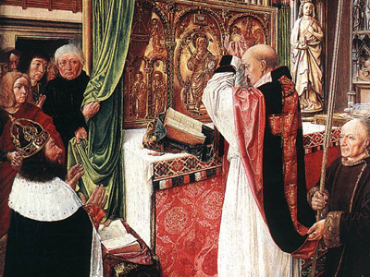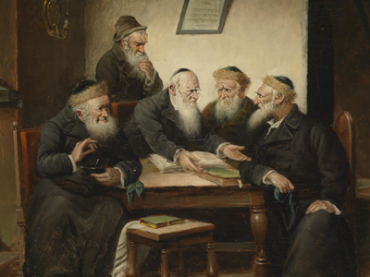Religion
Homilies on the Acts of the Apostles (Part Two)
Homilies 29–55
By John Chrysostom; Translated by Charles Marriot
Series: Kiraz Commentaries Archive 18
ISBN: 978-1-61143-361-6
These are the English translations of St. John Chrysostom’s homilies on Acts of the Apostles.
$175.00
Homilies on the Gospel of St. Matthew (Part One)
Part I: Homilies 1–25
By John Chrysostom; Translated by George Prevost
Series: Kiraz Commentaries Archive 19
ISBN: 978-1-61143-362-3
This book offers the English translations of St. John Chrysostom’s homilies on the Gospel of Matthew.
$183.00
Homilies on the Gospel of St. Matthew (Part Two)
Part II: Homilies 26–58
By John Chrysostom; Translated by George Prevost
Series: Kiraz Commentaries Archive 20
ISBN: 978-1-61143-363-0
This book offers the English translations of St. John Chrysostom’s homilies on the Gospel of Matthew.
$189.00
Homilies on Philippians, Colossians, and 1–2 Thessalonians
Series: Kiraz Commentaries Archive 22
ISBN: 978-1-61143-365-4
Assembled here are the English translations of St. John Chrysostom’s homilies on Philippians, Colossians, and 1–2 Thessalonians.
$226.00
Homilies on the Second Epistle to the Corinthians
By John Chrysostom; Translated by J. Ashworth
Series: Kiraz Commentaries Archive 23
ISBN: 978-1-61143-366-1
Assembled here are the English translation of St. John Chrysostom's homilies on 2 Corinthians.
$177.00
Homilies on 1–2 Timothy, Titus, and Philemon
By John Chrysostom; Translated by James Tweed
Series: Kiraz Commentaries Archive 24
ISBN: 978-1-61143-367-8
St. John Chrysostom’s homilies on 1–2 Timothy, Titus and Philemon are presented here in English translation.
$183.00
Mois de Marie
Edited by Paul Bedjan
Series: Syriac Studies Library 197
ISBN: 978-1-61143-404-0
An anthology of hymns and devotions to the Virgin Mary in ancient and modern Syriac, collected in honor of the fiftieth anniversary of the proclamation of the doctrine of the Immaculate Conception
$209.00
Le synaxaire géorgien
Redaction ancienne de l’Union arméno-géorgienne
Edited and Translated by Nikolai Marr
ISBN: 978-1-61719-890-8
The surviving text of a Georgian martyrology, on Stephen Protomartyr, Peter and Paul, shows the influence of Armenian Christianity on Georgia, and reflects 6th century preaching against Judaism.
$153.00
Martyrologes et douze ménologes syriaques
Edited and Translated by François Nau
ISBN: 978-1-61719-901-1
Contained in this work are thirteen lists of saints’ days in the Syriac tradition based on various sources.
$162.00
Makings of the Sea (Paperback)
Journey, Doubt and Nostalgia
Series: Mediterranea 1
ISBN: 978-1-61719-940-0
Makings of the Sea is an inquiry into the makings of the Mediterranean imagination in the 20th century, focusing on specific cases in the visual and performing arts, music and literature. It also questions a number of populist perceptions of the Mediterranean and its cultures. Following a thematic structure that falls broadly under the headings of journey, doubt and nostalgia, this is an essay on Mediterranean aesthetics.
$72.00
The Commentary of Saint Ephrem on Genesis with an Arabic Translation
Syriac Text and Arabic Translation by Assad Sauma Assad
ISBN: 978-1-61143-548-1
This book cantains the Syriac text of Saint Ephrem's Commentary on Genesis supplied with an Arabic translation and commentaries. Its text is one of the most beautiful texts in Syriac language. The book is good for the general readers and those who have interest in the Syriac fathers and churches.
$180.00
The Extremity of the Romans, and Praise before the Holy Mysteries
Syriac Texts and Translations
Edited and Translated by Isaac H. Hall
Series: Analecta Gorgiana 876
ISBN: 978-1-61143-442-2
These are two unique Syriac texts from the same manuscript.
$36.00
The Syriac Forms of New Testament Proper Names
Series: Analecta Gorgiana 894
ISBN: 978-1-61143-469-9
Argument by the Norris Professor of Divinity at Cambridge that the spelling of the Syriac version of the Gospels should not be taken as authority for the original Aramaic names.
$38.00
The Bazaar of Heracleides
Series: Kiraz Theological Archive 75
ISBN: 978-1-61143-472-9
Dialogue by Nestorius, Archbishop of Constantinople, vindicating his theology and his actions; translated from the manuscript of the Syriac translation discovered in 1889.
$219.00
The Syrian Churches
Their Early History, Liturgies and Literature
Series: Kiraz Liturgical Studies 68
ISBN: 978-1-61143-475-0
History of the Syriac-speaking churches, with comparative liturgies, and the Peshitta of the Gospels, translated into English.
$218.00
Form und Überlieferung der Lukas-Homilien des Origenes
By Max Rauer
Series: Analecta Gorgiana 895
ISBN: 978-1-61143-485-9
This text discusses the writings of Origen on the Gospel according to Luke.
$46.00
Yezidi Texts
Edited with an Introduction by Isya Joseph
Series: Analecta Gorgiana 902
ISBN: 978-1-61143-496-5
This paper provides an Arabic text and English introduction on the holy works and literature of the Yezidi faith.
$41.00
Studies in Manichaeism
Series: Analecta Gorgiana 903
ISBN: 978-1-61143-497-2
This work is a detailed study of Manichaeism from findings of a 1903 study in East Turkestan.
$33.00
Irenaeus gegen die Häretiker
Elenchos kai anatrope tes pseudonomou gnoseos; Buch IV und V in armenischer Version
By Irenaeus of Lyons; Edited by Erwand Ter-Minasiantz; In Collaboration With Karapet Ter-Mekerttschian
ISBN: 978-1-61143-514-6
This work presents the Armenian version of second-century Irenaeus of Lyon's last two books on heresies.
$96.00
Der Römerbrieftext des Origenes
nach der Codex von der Goltz
ISBN: 978-1-61143-517-7
This text is a variant of Paul's Epistle to the Romans.
$60.00
Fortschritt und Vollendung bei Philo von Alexandrien
Eine Studie zur Geschichte der Frömmigkeit
Series: Kiraz Jewish Studies Archive 17
ISBN: 978-1-61143-520-7
This work details the life of Alexandrian Jewish philosopher Philo and his guidance on the conduct of the spiritual life, with an introduction surveying the life and works of Philo and the critical writing on his philosophy.
$118.00
Kyrillos von Skythopolis
Edited by Eduard Schwartz; By Cyril of Scythopolis
ISBN: 978-1-61143-521-4
This work details the lives of seven Palestinian monks and abbots, written in popular Greek by Cyril of Scythopolis, a sixth-century monk.
$131.00
An Arabic Version of the Epistle of Dionysius the Areopagite to Timothy
Series: Analecta Gorgiana 919
ISBN: 978-1-61143-530-6
The letter that claims to be addressed by Dionysius the Areopagite to Timothy upon the martyrdom of Peter and Paul is not included among the epistles. It was composed originally in Greek, but it is exhibited in Arabic.
$34.00
Lily Montagu’s Shekhinah
By Luke Devine
Series: Judaism in Context 11
ISBN: 978-1-61143-684-6
Lily Montagu’s Shekhinah outlines Lily Montagu’s theological writing, particularly her appropriation of the feminine aspect of the divine presence, Shekhinah, and provides a much needed corrective to the androcentric Anglo-Jewish historiography that has ignored, marginalized, and completely erased the founder of the Liberal Jewish movement in England. Luke Devine’s book is vital reading for students of Anglo-Jewry, First-Wave feminism, Jewish feminism, Liberal Judaism, and Jewish mysticism.
$169.00
Burial Service for Nuns
Syriac Text with Translation
Edited and Translated by Sebastian P. Brock
Series: Moran Etho
ISBN: 978-1-61143-560-3
Sebastian Brock presents here the Syriac text and English translation of the liturgy for the burial of nuns in the Syriac tradition.
$111.00
Filter by
Filter by price
Filter by manufacturer



























